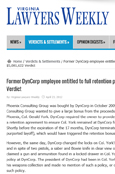Phoenix Consulting Group was bought by DynCorp in October 2009. The owner of Phoenix Consulting Group wanted to give a large bonus from the proceeds of the sale to the president of Phoenix, Col. Gerald York. DynCorp required the owner to provide most of the bonus in the form of a retention agreement to ensure Col. York remained at DynCorp for at least a period of 17 months. Shortly before the expiration of the 17 months, DynCorp terminated York without cause (under a purported layoff), which would have triggered the retention bonus payment.
However, the same day, DynCorp changed the locks on Col. York’s office and searched the office, and in spite of two pistols, a saber and Bowie knife in clear view on display in Col. York’s office, claimed a gun and ammunition found in a locked drawer in Col. York’s office violated the weapons policy at DynCorp. The president of DynCorp had been in Col. York’s office the week prior, admired his weapons collection and made no mention of such a policy, or concern about any violation of such policy.
The security officer tried to obtain Col. York’s signature on a document agreeing he had violated the policy, and if he did so, DynCorp fully intended to hand him the gun and ammunition while he was departing from the offices, and clearing out his office. Nothing was said about the other two pistols, saber or Bowie knife, and Col. York cleared those out as well without any expressed concern by the security officer. Ten days later, DynCorp sent Col. York a termination for cause, contending that he violated the weapons policy. DynCorp refused to pay Col. York’s retention bonus, claiming that the found gun in the locked drawer constituted a basis to terminate him for cause. Under the retention agreement, DynCorp would not have to pay the retention bonus if Col. York was terminated for cause. Also under the retention agreement, however, Col. York had a right to written notice of any specific violation and a 30 day opportunity to cure before he could be terminated for cause, which DynCorp did not do, claiming that the violation of their weapons policy was material and not curable because of the imminent danger to employees.
Judge White found that notice must be given, that DynCorp had contracted to provide notice and an opportunity to cure, under the circumstances it was curable, and Gerald York was therefore entitled to the full retention payment, plus interest from March 11, 2011 at 6 percent.
Other significant events: DynCorp’s expert was excluded because the designation was insufficient under Crane. The court also chastised counsel for DynCorp for discovery abuses during trial, including not providing clearly available information in discovery, while claiming it was not aware of any documents and not supplementing, and substituting its client’s self-serving documents for the actual documents requested.
[12-T-069]
Type of action: Breach of contract
Name of case: York v. DynCorp International LLC
Court: Fairfax Circuit Court
Case no.: CL-2011-04995
Tried before: Judge
Judge: Bruce D. White
Date: March, 29, 2012
Demand: $4,900,000
Offer: $1,900,000
Verdict or settlement: Verdict
Amount: $5,081,622 (plus interest at 6 percent from March 11, 2011 for a total of $5,401,555)
Attorneys for plaintiff: Rodney G. Leffler and Alexa K. Mosley, Fairfax; Elaine Charlson Bredehoft and Carla D. Brown, Reston
Attorneys for defendant: Stephen W. Robinson, David L. Greenspan, Hans P. Riede and Nicholas D. SanFilippo, McLean
Plaintiff’s expert: William Foote, CPA, Rockville, Md.
Defendant’s expert: Thomas E. Burdette, CPA, Farifax


